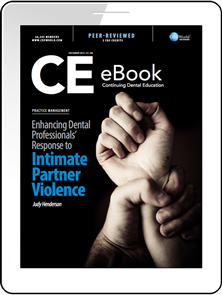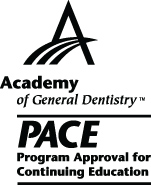CDEWorld > eBooks > Enhancing Dental Professionals' Response to Intimate Partner Violence


ADA CERP is a service of the American Dental Association to assist dental professionals in identifying quality providers of continuing dental education. ADA CERP does not approve or endorse individual courses or instructors, nor does it imply acceptance of credit house by boards of dentistry. Concerns or complaints about a CE provider may be directed to the provider or to ADA CERP at www.ada.org/cerp/

Approved PACE Program Provider. FAGD/MAGD credit. Approval does not imply acceptance by a state or provincial board of dentistry, or AGD endorsement. 1/1/2023 to 12/31/2028. ID # 209722.
eBook
Released: Thursday, December 17, 2015
Expires: Wednesday, October 31, 2018
Enhancing Dental Professionals' Response to Intimate Partner Violence
By Judy Henderson
Commercial Supporter: Parkell
All healthcare providers, including oral healthcare providers such as dental hygienists, should know and understand how to respond to intimate partner violence (IPV) victims when they present as patients. Providing such a response and meeting a standard of appropriate patient care would include conducting health and safety assessments, interventions, documentations, and referrals to social services. All dental professionals are uniquely qualified to identify victims of IPV because most of the injuries are to the head, neck, or mouth. This article will discuss how dental professionals, specifically dental hygienists, can provide resources for support and safety for patients who are victims of IPV.
LEARNING OBJECTIVES:
-
Define intimate partner violence.
-
Identify the common clinical signs of and types of abuse.
-
Describe the dynamics of an abusive relationship.
-
Plan how to routinely assess for child and elder abuse and neglect.
-
Discuss how to provide patient educational resources for intimate partner violence prevention.
-
Describe how to approach treatment with a patient who has been a victim of intimate partner violence and has experienced trauma around the head or mouth.
About the Author
Judy Henderson is with the Nevada Network Against Domestic Violence in Reno, Nevada.
Download FREE eBook now!

